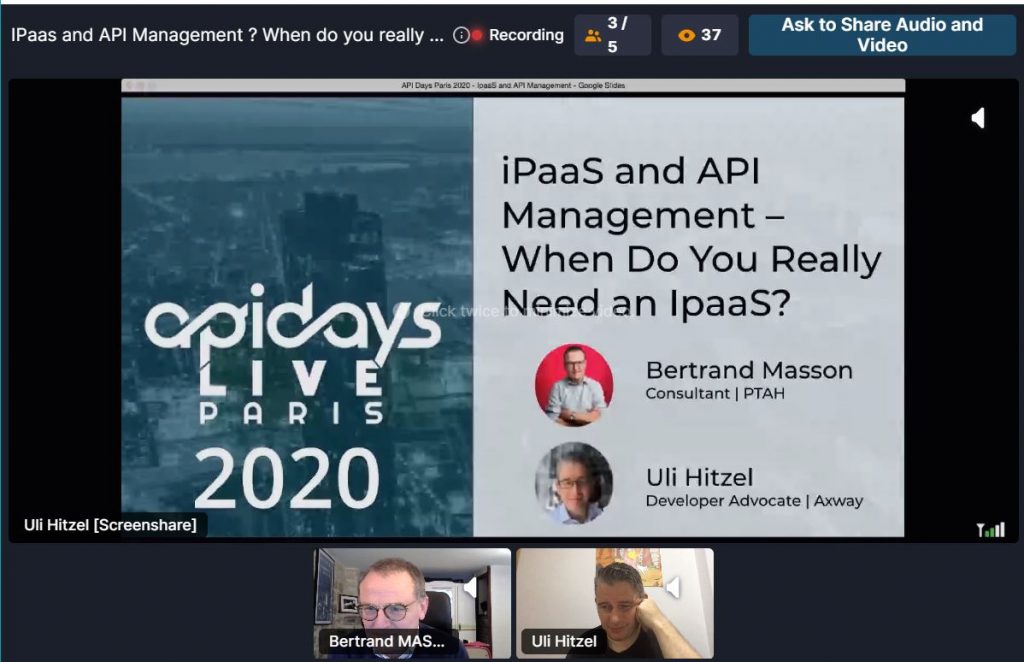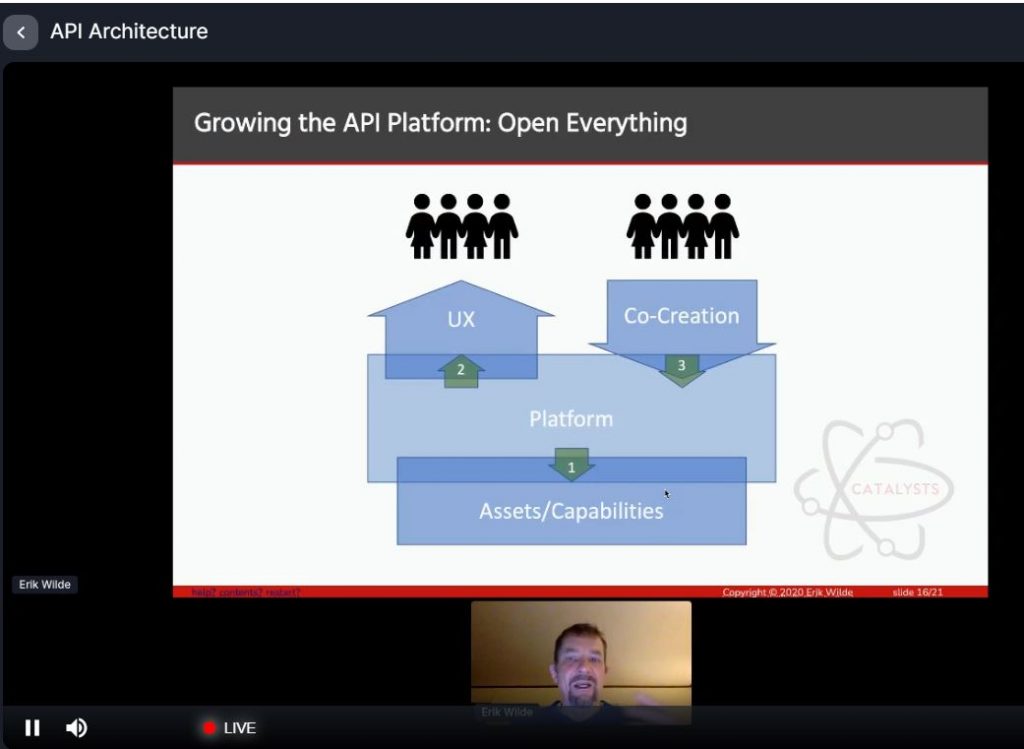Axway Catalysts were center stage at APIdays Paris, which took place December 8-10, 2020. This year’s event included a virtual booth and workshop by Uli Hitzel, along with presentations from Erik Wilde and Eric Horesnyi.
APIdays Paris 2020 focused on “Responding to the New Normal with APIs for Business.” The virtual conference brought together thousands of IT Managers, Architects, and CTOs to Senior Developers, PMs, and Business Execs.
iPasS vs APIs
Uli Hitzel, Digital Strategist and Product Manager for Open Banking led Axway’s workshop with Bertrand Masson, Consultant on SI Architecture & API Strategy at PTAH Consulting.

The two examined the commonalities and differences between APIs and iPaaS.
Common points
Both APIs and iPaaS allow you to connect to endpoints and systems. Note that transformation may be managed by API composition or via iPasS mapping.
API Management and iPaaS work together when there’s consumption, such as integrating APIs with data flow and connecting two APIs — both free data and functions. What’s important for an enterprise is that both accelerate digital transformation via IT innovation, the cloud, and third-party assets.
Differences
API Management with targeted users is available for developers to accelerate IT transformation which can be normalized with data and other companies — the logic falls within the development.
On the flip side, with iPaaS, citizen developers can accelerate digital business transformation.
API Management is mainly API exposition. iPaaS is more data and events orchestration.
When you choose iPaaS, it’s important to select the solution that suits your needs and connect with it via API Management to give an overview of its complexity.
The API world is based on HTTP, Swagger, or Open API. Certain standards in regions exist. APIs deal with specs and code, whereas iPaaS uses prebuilt connectors and codes.
Phases of iPasS and APIs
API Management and iPaaS enable free data and functions, along with self-service information systems. There are three phases to consider:
- Connect: Connection to everything is possible from on-premise to new software such as cloud and IoT.
- Transform: The importance of transforming is the channel you are using — a common point of API Management. Transformation can be done in developer mode and as a low-code
- Orchestration: By orchestrating software between humans, you are transforming information.
API Archaeology: Guiding the API journey.
On day two, we learned about API archaeology from Erik Wilde, API Catalyst. Erik shared the narrative of API archaeology and how APIs are not new, but they have a fresh way of doing certain things.

What’s new about APIs?
APIs remove the necessity to have a centralized “integration infrastructure.” They are designed to be used by more than one consumer. Additionally, Erik explained how to identify the potential and how to unlock it by using APIs.
APIs main purpose is to position business responsiveness within IT architecture.
API journey
The API journey tells the story of many APIs. The questions to ask are: How do you decide to turn them into an API and what is the best way to do it?
Start small and identify the low-hanging fruit for quick success and feedback. With API archaeology, you have an effective way to find candidates.
Switching from building systems to cultivating ecosystems is also required. Focus on constraints (what to do) and overrules (how to do them).
Only govern when you must (autonomy) and not when you can (authority). Start building a culture and community. Erik noted that API guidelines should reflect existing practices in an organization. Over time, by starting small, patterns will emerge.
APIs’ main value is aligning business agility with IT architectures.
Why add APIs?
APIs deliver experiences. Opening your company up is what APIs are all about by unlocking the value in resources and capabilities. It’s important to be receptive to adding the platform angle to your business perspective for further digital transformation capabilities.
Think API-First
API-First allows for co-creation. Scaling is never easy. By using APIs, you can slowly identify candidates to the model of old-school integrations.
API as Agent of Change
With Clark Kent and Superman as an analogy, Eric Horesnyi, VP, Catalyst, talked about how APIs have four superpowers to impact an organization.
Benefiting from hypergrowth and visualizing to create an open platform is key.
Four superpowers
- Open vision: By leveraging your API strategy, you get marketplace, experience, and data exchange. Open vision allows you to visualize your open platform. Think about the providers you want to connect with and features to leverage to integrate with third-party APIs.
- Super experience: API equals Product for a super experience. The goal is to create a customer experience as a Product Manager. SpareBank1 leveraged and created specialized APIs for a seamless experience. SpareBank1’s consumers are now immersed in their services which are distributed by developers.
- Break walls: By breaking walls that are a monolith, you unlock value from legacy systems into internal APIs. It’s important to embrace API natives — microservices and streams. You can also leverage microservices and events to drive efficiency. APIs break siloes which create disjointed experiences.
- Superstars: When it’s all built, you can attract consumers and developers to the platform. The product experience needs to be unique. The Belgian company Smals grew its platform by driving consumption within internal consumption. Be sure to set and communicate with stakeholders so they know what’s happening. It enables a superior experience and provides an open vision.
Key takeaways
APIs are agents of change within organizations. Be on top of what people are looking for in a business platform and don’t forget outreach. Knowing the four superpowers for APIs provides the best outcome.
Don’t miss out on the next exciting APIdays in Jakarta on February 24, 2021.
Discover five ways APIs help your enterprise during uncertain times
